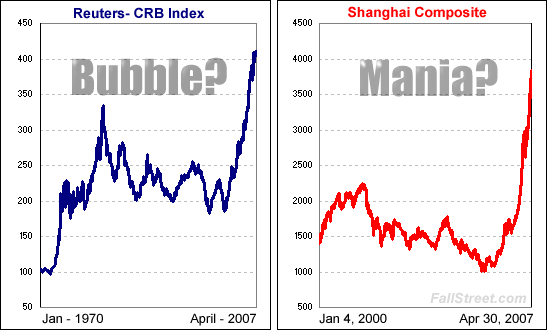|
May 7, 2007
Relativity In A World Gone China
“…we're seeing fewer investors in subprime but that money needs to be put to work so they're going into other credit markets….Historically when we've seen one problem, we've seen an adjustment throughout the marketplace. We've seen no indication of that yet.” BlackRock’s Larry Fink FT.
The idea that a blow-up in one area of the marketplace can ignite capital concentrations in another isn’t exactly novel. For example, years ago an emerging market blow-up(s) would immediately compel spooked investors to seek refuge in U.S. Treasuries. However, with regards to subprime the shift Mr. Fink alludes to is a little less obvious. Think about it: a bunch of dangerous loans are defaulting so investors are paying increasingly higher premiums for some other dangerous loans?
If indeed capital is shifting focus from risk to more risk it can be the result of only on thing: thousands of managers being more scared of not making enough money to keep their jobs rather than losing money.
China’s Thirst For Commodities & Equities
Even if you agree that China rigged its GDP statistics to smooth out a rough patch in growth in the late 1990s, it is safe to say that China’s economy has been an historic 8+year tear that is showing little signs of stopping. As remarkable as this expansion has been, more remarkable is the fact that Chinese equities have gone from being ignored to the most sought after in the world in little over 18-months time. For the record, Chinese stocks are currently escalating in price faster than nearly anywhere else, and the largest IPOs in the world are being manufactured in China - the returns are fantastic so long as you don’t wake up to days of limit down.
Is it an oversimplification to suggest that Chinese stocks and/or commodity prices will offer the first clues about when the worldwide liquidity driven craze will expire? I think not:
 |
Can The U.S. Still Attract The Safe Haven Flows?
Realizing that the majority of money managers vie to outperform at all costs (to their clients), the recent rally in U.S. equities could, strangely enough, be in response to an increasingly defensive posture by some managers. You wouldn’t think this was the case given that numerous surveys and data sets are telling us that both average and wealthy U.S. investors are showing an increasing preference for international stocks versus domestic issues. Nevertheless, what no one seems to be mentioning is that in the days following the February 27 meltdown U.S. stocks (S&P 500) outperformed the majority of world markets (the FTSE, Sensex, Shanghai, Nikkei, TSX, Bovespa, and gold). With this mind, could it be the case that U.S. stocks are not responding to ‘excessive liquidity’ math per se, but rallying based upon the expectation that the global bull market is nearly over?
As ridiculous as this theory may sound to those that believe ‘danger’ is a money manager’s middle name, something tells me that if China crashes and commodity prices get slammed GE yielding 3% will fall significantly less. Remember that money managers do not necessarily require double digit gains to remain employed, sometimes simply outperforming others will do.
While hardly a reason to bullish on U.S. equities, if you assume that a run out the dollar is not in the cards U.S. stocks are - comparatively speaking – trading at bargain prices compared to many places in the world.
|
